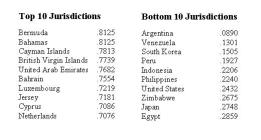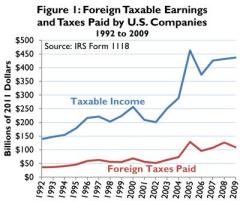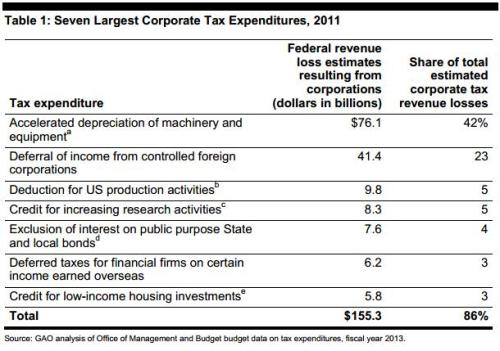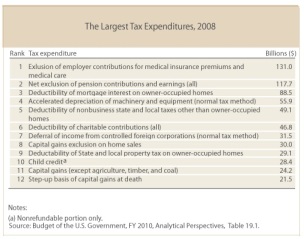If you get into the weeds of tax policy and had a contest for parts of the internal revenue code that are “boring but important,” depreciation would be at the top of the list. After all, how many people want to learn about America’s Byzantine system that imposes a discriminatory tax penalty on new investment? Yes, it’s a self-destructive policy that imposes a lot of economic damage, but even I’ll admit it’s not a riveting topic (though I tried to make it culturally relevant by using ABBA as an example).
In second place would be a policy called “deferral,” which deals with a part of the law that allows companies to delay an extra layer of tax that the IRS imposes on income that is earned – and already subject to tax – in other countries. It is “boring but important” because it has major implications on the ability of American-domiciled firms to compete for market share overseas.
Here’s a video that explains the issue, though feel free to skip it and continue reading if you already are familiar with how the law works.
The simple way to think of this eye-glazing topic is that “deferral” is a good policy that partially mitigates the impact of a bad policy known as “worldwide taxation.”
Unfortunately, good policy tends to be unpopular in Washington. This is why deferral (and related issues such as inversions, which occur for the simple reason that worldwide taxation creates a huge competitive disadvantage for U.S.-domiciled companies) is playing an unusually large role in the 2016 election and concomitant tax debates.
Consider the tax controversy involving Apple. The CEO does not want to surrender money that belongs to shareholders to the government.
Apple CEO Tim Cook struck back at critics of the iPhone maker’s strategy to avoid paying U.S. taxes, telling The Washington Post in a wide ranging interview that the company would not bring that money back from abroad unless there was a “fair rate.”
Since the discussion is about income that Apple has earned in other nations (and therefore about income that already has been subject to all applicable taxes in other nations),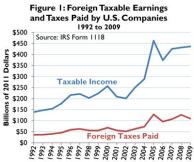 the only “fair rate” from the United States is zero.
the only “fair rate” from the United States is zero.
That’s because good tax systems are based on “territorial taxation” rather than “worldwide taxation.”
Though a worldwide tax system might not impose that much damage if a nation had a low corporate tax rate.
Unfortunately, that’s not a good description of the U.S. system, which has a very high rate, thus creating a big incentive to hold money overseas to avoid having to pay a very hefty second layer of tax to the IRS on income that already has been subject to tax by foreign governments.
Along with other multinational companies, the tech giant has been subject to criticism over a tax strategy that allows them to shelter profits made abroad from the U.S. corporate tax rate, which at 35 percent is among the highest in the developed world.
“Among”? I don’t know if this is a sign of bias or ignorance on the part of CNBC,  but the U.S. unquestionably has the highest corporate tax rate among developed nations.
but the U.S. unquestionably has the highest corporate tax rate among developed nations.
Indeed, it might even be the highest in the entire world.
Anyhow, Mr. Cook points out that there’s nothing patriotic about needlessly paying extra tax to the IRS, especially when it would mean a very punitive tax rate.
…a few particularly strident critics have lambasted Apple as a tax dodger. …While some proponents of the higher U.S. tax rate say it’s unpatriotic for companies to practice inversions or shelter income, Cook hit back at the suggestion. “It is the current tax law. It’s not a matter of being patriotic or not patriotic,” Cook told The Post in a lengthy sit-down. “It doesn’t go that the more you pay, the more patriotic you are.” …Cook added that “when we bring it back, we will pay 35 percent federal tax and then a weighted average across the states that we’re in, which is about 5 percent, so think of it as 40 percent. We’ve said at 40 percent, we’re not going to bring it back until there’s a fair rate. There’s no debate about it.”
Cook may be right that there’s “no debate” about whether it’s sensible for a company to keep money overseas to guard against bad tax policy.
But there is a debate about whether politicians will make the law worse in a grab for more revenue.
Senator Ron Wyden, for instance, doesn’t understand the issue. He wrote an editorial asserting that Apple is engaging in a “rip-off.”
…the heart of this mess is the big dog of tax rip-offs – tax deferral. This is the rule that encourages American multinational corporations to keep their profits overseas instead of investing them here at home, and it does so by granting them $80 billion a year in tax breaks. This policy…defies common sense. …some of the most profitable companies in the world can put off paying taxes indefinitely while hardworking Americans must pay their taxes every year. …that system creates a perverse incentive to keep corporate profits overseas instead of investing here at home.
I agree with him that the current system creates a perverse incentive to keep money abroad.
But you don’t solve that problem by imposing unconstrained worldwide taxation, which would create a perverse incentive structure that discourages American-domiciled firms from competing for market share in other nations.
Amazingly, Senator Wyden actually claims that making the system more punitive would help make America a better place to do business.
…ending deferral is a necessary step in making sure…the U.S. maintains its position as the best place to do business.
Wow, this rivals some of the crazy things that Barack Obama and Hillary Clinton have said.
Though I guess we need to give Wyden credit for honesty. He admits that what he really wants is for Washington to have more money to spend.
Ending deferral will also generate money from existing deferred taxes to pay for rebuilding our country’s crumbling infrastructure. …This is a priority that almost all tax reform proposals have called for.
By the way, can you guess which presidential candidate agrees with Senator Wyden and wants to impose full and immediate worldwide taxation?
If you answered Hillary Clinton, you’re right. But if you answered Donald Trump,  that also would be a correct answer.
that also would be a correct answer.
This is a grim example of why I refer to them as the Tweedledee and Tweedledum of statism.
Though to be fair, Trump’s plan at least contains a big reduction in the corporate tax rate, which would substantially reduce the negative impact of a worldwide tax system.
The Wall Street Journal opines on the issue and is especially unimpressed by Hillary Clinton’s irresponsible approach on the issue.
Mrs. Clinton is targeting so-called inversions, where U.S.-based companies move their headquarters by buying an overseas competitor, as well as foreign takeovers of U.S. firms for tax considerations. These migrations are the result of a U.S. corporate-tax code that supplies incentives to migrate… The Democrat would impose what she calls an “exit tax” on businesses that relocate outside the U.S., which is the sort of thing banana republics impose when their economies sour. …Mrs. Clinton wants to build a tax wall to stop Americans from escaping. “If they want to go,” she threatened in Michigan, “they’re going to have to pay to go.”
Ugh, making companies “pay to go” is an unseemly sentiment. Sort of what you might expect from a place like Venezuela where politicians treat private firms as a source of loot for their cronies.
The WSJ correctly points out that the problem is America’s anti-competitive worldwide tax regime, combined with a punitive corporate tax rate.
…the U.S. taxes residents—businesses and individuals—on their world-wide income, not merely the income that they earned in the U.S. …the U.S. taxes companies headquartered in the U.S. far more than companies based in other countries. Thirty-one of the 34 OECD countries have cut corporate taxes since 2000, leaving the U.S. with the highest rate in the industrialized world. The U.S. system of world-wide taxation means that a company that moves from Dublin, Ohio, to Dublin, Ireland, will pay a rate that is less than a third of America’s. A dollar of profit earned on the Emerald Isle by an Irish-based company becomes 87.5 cents after taxes, which it can then invest in Ireland or the U.S. or somewhere else. But if the company stays in Ohio and makes the same buck in Ireland, the after-tax return drops to 65 cents or less if the money is invested in America.
In other words, the problem is obvious and the solution is obvious.
But there are too many Barack Obamas and Elizabeth Warrens in Washington, so it’s more likely that policy will move in the wrong direction.

